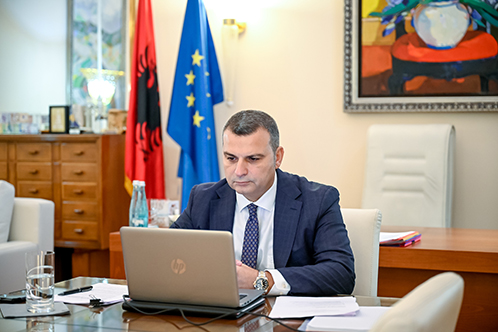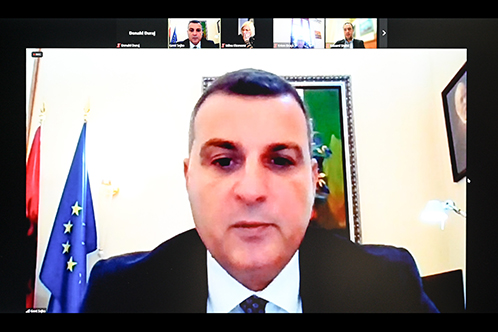BANK OF ALBANIA
PRESS RELEASE
Governor Sejko presents BoA’s opinion on 2024 Draft Budget to the Parliamentary Committee on Economy and Finance
Publication date: 10.11.2023
Honourable Chairman,
Honourable Members of the Committee,
First, I would like to thank you for the invitation and opportunity to present to this Committee the opinion of the Bank of Albania on the 2024 Draft Budget.

As always, the Bank of Albania has been and remains of the opinion that the drafting of an optimal budget should be based on realistic analyses and forecasts, to provide a fair balance between short-term priorities and medium- and long-term objectives, as well as to ensure a coordination as best as possible between fiscal policy, monetary policy and the current financial situation of Albania. In this context, we are convinced that the discussion of the draft budget with the widest possible category of institutional actors and groups of interest serves the approval of a document of the highest quality.

In compliance with the legal framework our institutional mandate and tasks of the Bank of Albania, our opinion will focus on three main topics:
- First, I will share with you the perspective of the Bank of Albania on the policy and fiscal measures that delineate this draft budget.
- Second, I will focus on some structural aspects of the budget and tax policy, as these aspects impact the effectiveness of fiscal policy and the flexibility of public finances in withstanding shocks.
- Third, I will briefly present some continuous suggestions of the Bank of Albania for enhancing the long-term sustainability of public finances.

In summary, I find it appropriate to emphasise that - in our judgement - the draft presented for consideration is based on a realistic framework of macroeconomic forecasts. Also, this Draft Budget envisages a consolidating fiscal policy, which is in line with our monetary policy stance, as well as it addresses some of the country's sustainable and long-term development priorities. In parallel, with these findings, I would like to highlight that this Draft Budget confirms the progress made over the years, in terms of observing the principles of fiscal responsibility, the strengthening of technical and analytical capacities, as well as the priority in addressing the development needs.
However, I also find it appropriate to point out that the challenges we face remain both serious and complex. Therefore, all the institutional actors of the country's development must be attentive to: the economic developments; continuously assess the suitability of the policies they follow; as well as ensure the necessary flexibility for response in a timely manner to possible shocks.
Honourable members of the Parliament, allow me to further detail our opinion, starting with the first point.
1. Macoeconomic context and fiscal policy
The Draft Budget 2024 comes to life in a relatively favourable context of economic developments in Albania.
The Albanian economy has dealt with a continuous series of challenges in the last four years: the 2019 earthquake, the 2020-2021 pandemic, as well as the economic and financial consequences of the armed conflict in Ukraine. These challenges have triggered a refocusing of economic policies and have had a relatively high financial bill. However, the Albanian economy has demonstrated resilient in an admirable manner, reflecting the flexibility of the private sector, the fruits of the continuous work we have done to strengthen economic and financial stability, as well as the success of the countercyclical policies we have implemented.
As a result, after the fast rebound recorded in 2021 and 2022, the economic activity in Albania expanded further over 2023. According to our assessments, the Albanian economy is expected to grow by around 3.5% in the current year and to record further growth over the next year. This economic growth has enabled an overall rise in employment and wages, as well as an improvement in the country's economic and financial balances. In more concrete terms, inflation has marked a progressive decline over 2023, the budget and current account deficits have been reducing, the public and foreign debt of the country has come down, while the financial balances of the banking sector along with enterprises and households are sound.
In this context of developments, the Bank of Albania deems that fiscal policy should have a twofold priority: on the one hand, this policy should aim at the further consolidation of the economic, monetary and financial stability of the country and, on the other hand, it should increase attention to long-term development challenges.
In our vision, the 2024 Draft Budget maintains a good balance between these two objectives.
Fiscal policy is projected to maintain the consolidation trend over the course of 2024, anchored in an overall budget deficit, at around 2.5% of GDP, and in a positive primary balance, at around 0.2% of GDP. The Bank of Albania concludes that this orientation of fiscal policy serves to strengthen the economic and financial balances of the country and is consistent with our monetary policy stance. To further elaborate this point, I would like to underline as follows.
- First, maintaining the consolidating trend of the fiscal policy enables inflation returns faster to the target and at lower costs. We deem that the high inflation rates have been and remain the foremost challenge of our economic policies. High inflation erodes household purchasing power, harms the well-being of the low-income groups of society, as well as reduces the efficiency of resources allocation in the economy, by curtailing the sustainable and long-term growth of the country. The fast surge in prices across international markets in the last year fuelled this inflation, while the latter is hiking on the back of the high demand for goods and services, coupled with the shortages noted in our domestic labour market. These shortages led to a fast growth in wages and production costs. Therefore, in compliance with our legal mandate of price stability, we have embarked on a gradual normalisation of monetary policy stance. However, as we have emphasised in our public communications, the intensity of this normalisation has been lower than that implemented by the European Central Bank and the other regional central banks, due to fiscal consolidation and the strengthening of the exchange rate during 2023. From this perspective, I would like to highlight that maintaining the fiscal policy's consolidating trend over the course of next year, enables safeguarding of this approach, i.e. a more gradual normalisation of monetary policy stance, by creating the premises for both a faster return of inflation to the target and minimizing costs to the private sector.
- Second, maintaining the consolidating trend of fiscal policy serves the long-term sustainability of public finances. Projections of the draft budget suggest that the gross debt of public sector is expected to fall below 60% of GDP in 2024, marking its lowest level for more than a decade. As we have continuously emphasised, the high level of public debt has been and remains one of the structural weaknesses of the Albanian economy, by reducing our ability to withstand shocks and dictating higher financing costs for the private sector. Therefore, we have requested and supported any fiscal initiative and policy which enables the sustainable reduction of public debt.
- Third, maintaining the consolidating trend of fiscal policy, boost the stability of the domestic financial markets. Fiscal consolidation means lower financing needs during the year, thus helping to control the yields curve in the domestic financial market, as well as reducing interest rate fluctuations in it.
In terms of revenue, the 2024 Draft Budget envisages an overall growth in public revenue at 3.8%, driven by an expected decrease in revenues from grants, at 45%, and an expected increase in tax revenues, at 6.3%. The expansion of tax revenues is based on projections for growth in the volume of economic activity, at small changes - but still with a positive contribution to the budget - of the tax policy, as well as on the expected effects of measures to reduce fiscal evasion.
We deem that the revenue projection for 2024 is achievable. Also, the Bank of Albania welcomes the reduction of changes in tax and customs fees as well as the increased focus on enhancing formalization of the economy. These objectives serve to increase the transparency and efficiency of the tax policy, as well as to strengthen fair competition in the private sector.
However, the Bank of Albania draws attention to the fact that the level of public revenue collection in Albania, currently at around 28% of GDP, remains relatively low compared to that in regional countries, whose average stands at around 36% of GDP.
In this context, the Bank of Albania considers that:
- First, the timely consolidation of public finances’ soundness should be based on the progressive growth in the level of revenue collection. This approach helps the sustainability of public debt and preserves the necessary spaces for expenditures in support of strategic priorities of development, and more specifically, for making investments in education, health and infrastructure.
- Second, the sustainable growth of public revenues should be carried out by a line of action, which should first aim at reducing informality and further look at the space for simplifying and the right-balancing the tax burden, among different economic and social categories of society.
In terms of expenditures, the 2024 Draft Budget envisages a growth in their total to 4.3%, dictated by the increase in current expenditure to 9.6%, and the reduction of capital expenditure to 6%. In greater detail, the increase in current expenses reflects the effect of the wages reform in the public sector as well as the increase in the debt servicing costs, as financing costs in Albania and in the world went up. On the other hand, the reduction in the level of public investments seems to have been driven by the 60% drop in funds allocated for the reconstruction process.
Overall, the Bank of Albania considers that the structure of public expenditures addresses two long-term development priorities. It preserves relatively significant spaces for public investments, at around 5.3% of GDP, as well as provides the necessary funds for rising wages in the public sector, aimed - in particular - at increasing efficiency and creating appropriate stimuli for employment across priority sectors, such as health, education and public order.
At the end of this section, I would like to highlight that - we deem - the balance of risks to the economic growth projections and budget revenues are on the down side. In this view, we continue to suggest the drafting of contingency plans, to withstand the possible adverse impact that unpredicted shocks may have on the realisation of revenues. These contingency plans should aim - at any case - the observation of the approved budget deficit limits and the preservation of public debt declining trend.
Most esteemed members of parliament allow me to proceed with the second topic in our vision.
2. Enhancing the effectiveness and sustainability of public finances
The effectiveness and flexibility of public finances are two very important criteria for judging the degree of fulfilment of two important objectives of fiscal policy: supporting the long-term development of the country and the ability of fiscal policy to react against unforeseen developments.
In this context, it is encouraging that Albanian public finances have historically had a positive primary balance, which has fluctuated around 1.9% of GDP over the last five years. This positive balance means that the Albanian public sector allocates a part of its current income to finance investments and increase the stock of public capital, in turn accelerating the long-term economic growth. In parallel, a positive primary balance provides the necessary flexibility to tackle various shocks, as the necessary fiscal adjustment to meet revenue shortfalls can be accommodated more easily through a temporary rescheduling of the investment plan than through a reduction of current expenses.
The 2024 Draft Budget maintains this positive feature of our fiscal policy. It foresees a positive current balance, at 2.8% of GDP, which enables the financing of most of the public investments for 2024.
However, in terms of further enhancing the effectiveness and flexibility of public finances in the future, the Bank of Albania suggests as follows:
First, the adoption of a work plan which should aim at the sustainable growth of public revenue. As I emphasised above, the work in this regard should be primary focused on reducing informality and increasing the level of revenue collection, within the existing tax framework. Meanwhile, in parallel, the Bank of Albania supports the efforts to adopt - at the most reasonable time - a medium-term public revenue strategy. This strategy should serve as the anchor and guide of our tax system, reassessing the priorities and instruments of this system, as well as fostering its stability and predictability. In these terms, the Bank of Albania suggests the need for a periodic review of the efficiency of tax exemptions. These facilities, which aim to support certain social categories or encourage priority sectors, have a significant cost on public finances. For that reason, their implementation should be based on a more complete analysis of the costs and benefits that these exceptions have on public finances and on the overall development of the country.
Second, in terms of the expenditure structure, the Bank of Albania suggests the possibility of adopting a long-term operational objective, which would guarantee the maintenance of a positive current balance, at a certain level.
Third, the Bank of Albania draws attention to the fact that the realisation of the budget indicators - and in particular the investment plan - should have a more even distribution during the year. Their chronic concentration in the second half of the year brings about unnecessary fluctuations in economic indicators and financial markets, in turn reducing the efficiency of public spending.
Dear ladies and gentlemen, allow me to present the third and final point.
3. On enhancing the long-term sustainability of public finances
The Draft Budget 2024 is a positive step towards strengthening the long-term sustainability of public finances. This Draft Budget envisages the reduction of public debt, from 61.5% of GDP expected for 2023, to 59.8% of GDP for 2024.
However, in line with our previous communications, we deem that the addressing - in both medium and long term - of some issues remains necessary, of the following:
On deficits in health and social insurance schemes
The sustainability of social and health insurance schemes continues to pose a serious challenge to the public finances, particularly in the context of unfavourable demographic trends and the free movement of labour force. In the Draft Budget 2024, the deficit of these schemes is projected at around 3.6% of the GDP or 1.1 percentage points higher than the overall budget deficit. Therefore, the Bank of Albania suggests the regular review of the regulatory framework that regulates the private pension schemes; the health insurance scheme; and the other social insurance schemes. In addition, we encourage the intensification of efforts for developing the second and third pillars of the private system of pensions, that of compulsory and voluntary insurance scheme. These important pillars of contemporary pension systems would contribute to increasing the adaptability of social and health insurance schemes to demographic changes and setting them on stable and affordable trajectories for the state budget.
On the management of Public - Private Partnership programmes
For enhancing effectiveness and reducing the potential risks that come from PPPs, the Bank of Albania suggests:
- Including an overall upper limits on the PPPs contracted total value. This adjustment would supplement the control of the level of potential risk that PPPs would have on the soundness of public finances.
- Continuous improvement of professional capacities of units that manage the assessment, contraction and monitoring of these projects, particularly regarding legal and financial obligations that they pose to the budget.
***
Honourable Chair,
Dear members of the Parliament
Thank you for your attention!

 Twitter
Twitter
 Youtube
Youtube
 Facebook
Facebook
 Flickr
Flickr
 RSS
RSS
 Subscribe
Subscribe
 Feedback
Feedback